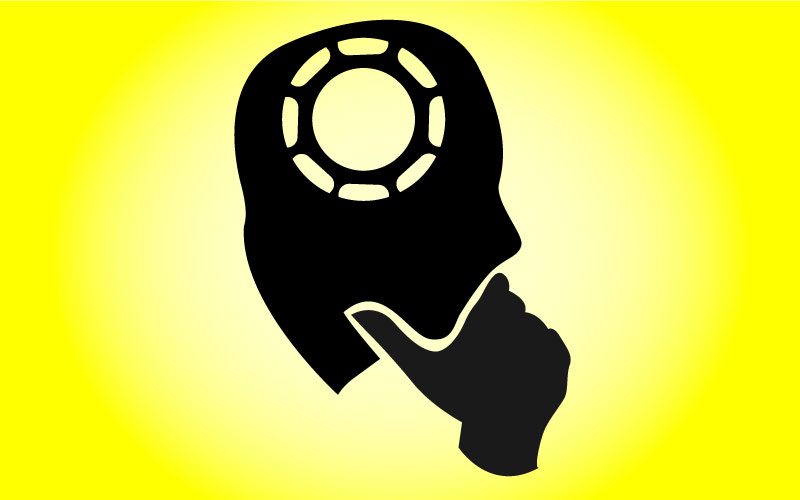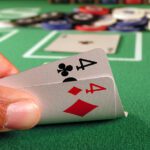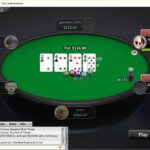There are several similarities that you can find between the game of Poker and Life in general. One of these would be to compare a poker player to a major league baseball pitcher. Every at bat is a world on itself, and you have to keep a cool head through all of them. There are games in which you pitch really badly and still come up with the win, and there are also games in which you would pitch really well but still lose for the minimum. And finally, a blown save during the world series is something that will affect you for life, and some people never recover. If you have played at least a few hands of poker you would see these exact same scenarios happen on the felt right before your very eyes, replacing the pitcher with yourself, the at bats with the hands, and the blown world series save with you at a major tourney heads-up versus some lucky donk.
And just like that, there are many more examples. The consensus seems to be that if something occurs in a specific way in real life, then that is the very exact way it should happen in the poker world as well. For instance, in life in general, people like to set goals. Whether it’s to save enough for that trip to Acapulco, or getting an American iTunes account despite not having an American address, or perhaps saving up $1,000 every month towards that new car, etc., people are always looking for goals to set. Goals should have a clear definition, a timeframe, and expected results for it to be considered a proper goal. .
So likewise, people will try to apply that same train of thought to poker. Common beginner poker goals are something like this:
–Win $2,500 in September:
–Play 18,000 hands at 5 PT/BB this month:
–Reach a 60,000 bankroll for 2010
And so on. But all of these share the same trait – they are monetary. Beginning players are especially prone to setting monetary goals. And here will follow a succinct explanation as to why that is truly problematic when it comes to poker.
See, in the game of poker, you have absolutely no control on the outcome of hands or specific results over any given period. You can do your best to get yourself in the best possible situations, but as long as there are more cards to come, you will still be at the mercy of Lady Luck, whether you are ahead or behind in any given game.
Make no mistake though, having goals is definitely something very good for your game. Having and setting goals make sure you stay focused while grinding, and also allows you to gauge your progress against your own standards. If you don’t have any goals you are more likely to wander around without purpose on whichever path you unwittingly take, and as some may argue, you are going to be less likely to succeed. Setting goals is therefore one of the most important things in the cycle of self improvement. But you have to know how to do it properly.
In poker, which is like a bizarre version of reality, some things should not make sense for them to make sense. You would have to go against accepted logic for it to work. Case in point, when you are setting goals for you to succeed, you will have to look at other places than money. If your goal is to “Reach X Level by the next month, and earn $X in the process”, you are bound to fail. You will alter your play significantly while trying to get there and there is also a great chance that you will become scared money in the process. You will be very averse to risks, which will in turn decrease your expected win rates, which will in turn make it really difficult if at all possible to play well.
Here are a few reasons as to why it is bad to have monetary goals in poker. Once you understand the logic behind them, you will instantly (hopefully) realize why they are wrong.
For one, what conclusions can you draw from hitting or missing a monetary goal? As explained in the major league baseball pitcher analogy, there will be games in which you play extremely well and still lose, while others in which you only pitch balls and keep missing the strike zone entirely, and still end up with a one-hitter and the win by like 15 runs. In poker, you can have streaks that are much like that, with you continually hitting 1-outers on the river or ginning any number of flops (and the opponents dutifully paying you off for no reason). Obviously, the opposite can also happen, with opponents hitting all sorts of cards you forgot about in the deck to stack you, and with you literally bubbling out of hundreds of consecutive SNGs just like that. *SNAP*
Did you play well? Did you play bad? Was your play only against droolers and really, truly, unbelievably bad players? Or instead vs. only better players than you? Or a mix? If you miss a specific monetary goal/target what can you do other than tilt uncontrollably with the potential of losing even more? Were you kissed by short term luck or were you destroyed by the same thing?
As you can see, it generally is impossible to draw any conclusions of note if you hit or miss a money target. There are way too many variables that can skew results one way or the other. The only way to counter this is to increase the playing volume, play well, and hope for the best. You can definitely control the volume of play, but you have absolutely no control over the results of your play. That is probably the most important concept for you to understand when it comes to goals in the game of poker.
Another huge reason to steer clear of monetary goals and targets in poker is that it may make you results oriented, and will therefore affect your decision making while at the table. Think about this one for a second. As an example, say that you are striving to hit a monetary target, say 5 BB/100 over 10,000 hands. Now, 8,000 hands in you are at 6 BB/100. As soon as you realize this, you will start to play much more timidly in order to minimize losses on your way to reach the goal you have set for yourself. Now what if the opposite happened? Say that 8,000 hands in you are actually at just 1 BB/100. You will now go in agro mode, in a go-big-or-go-home sort of way. This is also very bad. You cannot force things to happen the way you would want them to in poker. The moment you try to do this, only unpredictable things are going to happen. And when the unpredictable things start to happen, reaching your goal is going to be the last of your worries. Things can go very damn bad very damn quickly.
So, we have established that setting goals is important, and we have also seen a few examples on how not to set goals. Now we will follow with the correct ways, and the reasoning behind them.
While setting a poker goal, you will have to keep just two things in mind. For one, make sure that the goal in question is not outside of your power to achieve. Goals which indicate you need to win whatever amount of money is definitely out of your power to achieve, unless you are a direct descendant of Nostradamus or something. Volume-based goals, however, can definitely be within your power to achieve. Other realistic goals are reading x amount of poker books in x timeframe, posting x amount of hands in x timeframe on x amounts of poker forums. not playing more than x amount of tables for x amount of hours, and on and on. That sort of thing can be easily done and also kept under your control.
And lastly, when setting a poker goal, make sure it does not conflict with your ability to make the best play possible during a hand. The ultimate goal in poker is to always make the best play based on whatever variables you may have, such as reads, history, board cards etc. A goal that conflicts with your ability to make the best play during any given hand will make your game suffer, and will have even more adverse effects on your results than Lady Luck does.
Examples of goals that are within your control are “I will play 100,000 hands this month at 100NL, and play them well” or “Today I will play at least 150 Single Table Tournaments”. Those would be so much better. Win or lose, you can ensure you reach your goal by simply playing the amount of hands or registering for that amount of tournaments and not caring about the results. As long as you do not go broke (an always present danger of poker) before reaching the end of the goal, you can definitely reach it. The secret to success is that none of these goals have monetary ends to them, but of course it does not hurt to run a little bit well and end up with a profit once you reach the goal in question.
You have to be mindful of your goals, and whenever you have them do review them as often as possible. Make sure that it does not conflict with your game at any time, and also make sure it does not make you results oriented or that it affects your results directly. Make sure it is something that you can achieve without having to depend on things going just right and/or things out of your influence. And then, make sure that whatever goal you set allows you to always make the best possible decision every time you have to make a decision.
You will be fine. Hopefully 😉
Submit your review | |








